Conflict Zones
Hegseth warns of China threat as Beijing’s top brass skip Singapore summit | Military News
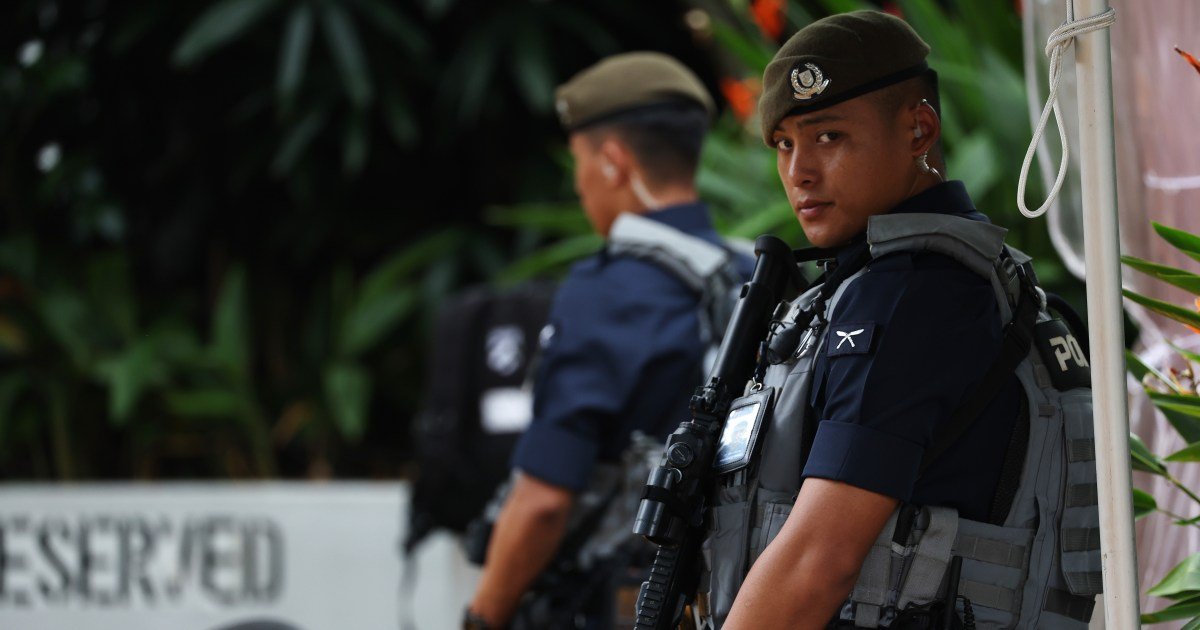
Singapore – Of the many military officials darting across the lobby of Singapore’s Shangri-La Hotel this weekend, there has been one significant absence.
China’s Defence Minister Dong Jun skipped the annual Shangri-La Dialogue, Asia’s premier security forum, with Beijing sending a delegation of lower-ranking representatives instead.
It was the first time since 2019 that China has not dispatched its defence minister to the high-level dialogue on regional defence, except when the event was cancelled in 2020 and 2021 due to the COVID-19 pandemic.
Beijing’s decision raised eyebrows in Singapore, coming at a time of heightened tensions between China and the United States – the world’s two biggest superpowers.
Dong’s absence meant there was no face-to-face meeting with his US counterpart, Secretary of Defence Pete Hegseth, who had the floor to himself on Saturday when he told the defence forum that the military threat posed by China was potentially imminent.
“It has to be clear to all that Beijing is credibly preparing to potentially use military force to alter the balance of power in the Indo-Pacific,” Hegseth told delegates in Singapore.
Pointing to China’s regular military drills around Taiwan as well as increasingly frequent skirmishes in the South China Sea, Hegseth said Beijing was proactively harassing its neighbours.
“There’s no reason to sugar-coat it. The threat China poses is real, and it could be imminent,” Hegseth said.
He also pointed to China’s growing military assertiveness as a reason for Asian nations to boost their defence spending, pointing to Germany, which has pledged to move towards spending 5 percent of its gross domestic product (GDP) on defence.
“It doesn’t make sense for countries in Europe to do that while key allies in Asia spend less on defence in the face of an even more formidable threat,” Hegseth said.
The defence chief also looked to reassure Asian allies that Washington was committed to Asia Pacific security despite strained ties in recent months as US President Donald Trump targeted some close allies with hefty trade tariffs.
“America is proud to be back in the Indo-Pacific, and we’re here to stay,” he said, opening his speech.
Some analysts were quick to play down the severity of Hegseth’s warnings about China.
“Short of a very few countries, not many in this part of the world see China as an imminent threat and would up their [defence] spending,” said Dylan Loh, assistant professor in the public policy and global affairs programme at Singapore’s Nanyang Technological University.
China tight-lipped on defence chief’s absence
In previous years, the Shangri-La Dialogue had provided a rare platform for meetings between Chinese and US officials in the more informal surroundings that the summit could offer.
The structure of the schedule also allowed Beijing’s military chiefs to directly respond to the keynote speech from the US defence secretary and to present their narrative to other members of the Asia Pacific.
Beijing has remained tight-lipped on the reason for Defence Minister Dong’s absence from the forum, fuelling an information void that has been filled by speculation.
One theory is that China did not want to send a high-profile delegate to the event at such a sensitive time as Beijing navigates the tariff war with the Trump administration.
“Any sort of faux pas or comments that may go off script can be picked up and picked apart or misconstrued,” said Loh, of Singapore’s Nanyang Technological University.
“So the question is why take the risk when US-China relations are at a very delicate point at this moment,” Loh told Al Jazeera.

The Shangri-La Dialogue weekend has not always been the easiest occasion for Chinese defence ministers. In recent years, they have faced difficult questions from their counterparts in other countries, who are unhappy with Beijing’s increasing assertiveness in the Asia Pacific region.
Loh said this could be another factor in Dong’s absence from the high-profile event.
“Any Chinese defence minister coming to Singapore now will be exposing himself and the country to political risk,” he said. “Themes like the South China Sea and possibly Taiwan will emerge, which makes China a convenient target,” Loh added.
Dong was appointed as China’s defence minister in late 2023, after his predecessor, Li Shangfu, was removed from office.
Less than a year into the job, there was speculation surrounding Dong’s new position following media reports that he was under investigation as part of a wider investigation into corruption in the Chinese military. Beijing denied the reports, with the minister continuing to maintain a public profile despite the allegations.
There has also been intense scrutiny of China’s military, following reports of an apparent purge of top-level officials by President Xi Jinping.
One of Beijing’s most senior generals, He Weidong, was missing from a high-profile political meeting in April, adding to rumours surrounding a possible restructuring in the People’s Liberation Army (PLA).
Ian Chong, a nonresident scholar at the Carnegie China research centre, said such speculation could be a factor in Dong’s no-show in Singapore.
“Because of the domestic turmoil with China’s senior military, they perhaps don’t want to, or the PLA itself feels that it’s not in a position to send somebody senior,” Chong told Al Jazeera.
Announcing Dong’s absence at a news conference before the summit, Chinese military spokesperson Senior Colonel Zhang Xiaogang maintained that communication channels were still open between defence officials in Washington and Beijing.
“China places great importance on US-China military ties, and is open to communication at different levels,” Zhang said.
Conflict Zones
US-backed GHF suspends Gaza aid for full day, names new evangelical leader | Israel-Palestine conflict News

Israeli military warns access roads to the Gaza Humanitarian Foundation’s (GHF) aid distribution sites are now considered ‘combat zones’.
The United States- and Israeli-backed Gaza Humanitarian Foundation (GHF) will suspend aid distribution in the war-torn territory on Wednesday, a day after Israeli forces again opened fire on Palestinian aid seekers near a GHF distribution site, killing at least 27 and injuring more than 100.
Israel’s military also said that approach roads to the aid distribution centres will be “considered combat zones” on Wednesday, and warned that people in Gaza should heed the GHF announcement to stay away.
“We confirm that travel is prohibited tomorrow on roads leading to the distribution centers … and entry to the distribution centers is strictly forbidden,” an Israeli military spokesperson said.
In a post on social media, GHF said the temporary suspension was necessary to allow for “renovation, reorganisation and efficiency improvement work”.
“Due to the ongoing updates, entry to the distribution centre areas is slowly prohibited! Please do not go to the site and follow general instructions. Operations will resume on Thursday. Please continue to follow updates,” the group said.
The temporary suspension of aid comes as more than 100 Palestinian people seeking aid have been reported killed by Israeli forces in the vicinity of GHF distribution centres since the organisation started operating in the enclave on May 27.
The killing of people desperately seeking food supplies has triggered mounting international outrage with United Nations Secretary-General Antonio Guterres demanding an independent inquiry into the deaths and for “perpetrators to be held accountable”.
“It is unacceptable that Palestinians are risking their lives for food,” Guterres said.
The Israeli military has admitted it shot at aid seekers on Tuesday, but claimed that they opened fire when “suspects” deviated from a stipulated route as a crowd of Palestinians was making its way to the GHF distribution site in Gaza.
Israel’s military said it is looking into the incident and the reports of casualties.
On Tuesday, GHF named its new executive chairman as US evangelical Christian leader Reverend Dr Johnnie Moore.
Moore, who was an evangelical adviser to the White House during the first term of United States President Donald Trump, said in a statement that GHF was “demonstrating that it is possible to move vast quantities of food to people who need it most — safely, efficiently, and effectively”.
The UN and aid agencies have refused to work with the GHF, accusing the group of lacking neutrality and of being part of Israel’s militarisation of aid in Gaza. Israel has also been accused of “weaponising” hunger in Gaza, which has been brought about by a months-long Israeli blockade on food, medicine, water and other basic essentials entering the war-torn territory.
Moore’s appointment is likely to add to concerns regarding GHF’s operations in Gaza, given his support for the controversial proposal Trump floated in February for the US to take over Gaza, remove the Palestinian population, and focus on real estate development in the territory.
After Trump proposed the idea, Moore posted video of Trump’s remarks on X and wrote: “The USA will take full responsibility for future of Gaza, giving everyone hope & a future.”
Responding on social media to UN chief Guterres’s outrage following the killing of aid seekers in Gaza on Sunday, Moore said: “Mr Secretary-General, it was a lie… spread by terrorists & you’re still spreading it.
The GHF’s founding executive director, former US marine Jake Wood, resigned from his position before the Gaza operation began, questioning the organisation’s “impartiality” and “independence”.
Critics have accused GHF, which has not revealed where its funds come from, of facilitating the Israeli military’s goal of depopulating northern Gaza as it has concentrated aid distribution in the southern part of the territory, forcing thousands of desperate people to make the perilous journey to its locations to receive assistance.
Conflict Zones
Five UN food aid workers killed in Sudan ambush as hunger crisis deepens | Sudan war News

Deadly attack on United Nations convoy in Sudan disrupts aid to hunger-stricken families in the war-torn country.
An ambush on a United Nations food aid convoy in Sudan has killed at least five people, blocking urgently needed supplies from reaching civilians facing starvation in the war-torn Darfur city of el-Fasher.
Aid agencies confirmed on Tuesday that the 15-truck convoy was transporting critical humanitarian supplies from Port Sudan to North Darfur when it was attacked overnight.
“Five members of the convoy were killed and several more people were injured. Multiple trucks were burned, and critical humanitarian supplies were damaged,” the UN Children’s Fund (UNICEF) and the World Food Programme (WFP) said in a joint statement.
The agencies did not identify the perpetrators and called for an urgent investigation, describing the incident as a violation of international humanitarian law. The route had been shared in advance with both warring parties.
The convoy was nearing al-Koma, a town under the control of the paramilitary Rapid Support Forces (RSF), when it came under fire. The area had witnessed a drone attack earlier in the week that killed civilians, according to local activists.
Fighting between the RSF and the Sudanese army has raged for over two years, displacing millions and plunging more than half of Sudan’s population into acute hunger. El-Fasher, the capital of North Darfur, remains one of the most vulnerable regions.
“Hundreds of thousands of people in el-Fasher are at high risk of malnutrition and starvation,” the UN statement warned.
Both sides blamed each other for the attack. The RSF accused the army of launching an air attack on the convoy, while the army claimed RSF fighters torched the trucks. Neither account could be independently verified.
The attack is the latest in a string of assaults on humanitarian operations.
In recent weeks, RSF shelling targeted WFP facilities in el-Fasher, and an attack on El Obeid Hospital in North Kordofan killed several medical staff. Aid delivery has become increasingly perilous as access routes are blocked or come under fire.
Conflict Zones
Two suspected Ugandan rebels killed in Kampala explosion | Conflict News

A female suicide bomber and another suspected rebel were killed in a blast in Uganda’s capital city.
Two suspected Allied Democratic Forces (ADF) rebels, including a female suicide bomber, were killed in an explosion near a prominent Catholic shrine in Uganda’s capital, Kampala, as crowds gathered to mark Martyrs’ Day.
The blast on Tuesday took place in the upscale suburb of Munyonyo, outside the Munyonyo Martyrs’ Shrine, where Ugandans were assembling to commemorate 19th-century Christians executed for their faith. No civilian injuries were reported.
“A counterterrorism unit this morning intercepted and neutralised two armed terrorists in Munyonyo,” said army spokesman Chris Magezi on X. He confirmed one of the assailants was a female suicide bomber “laden with powerful explosives”.
Footage broadcast by NBS Television, an independent outlet, showed a destroyed motorbike and debris scattered across the road. Police Chief Abas Byakagaba told NBS the explosion occurred while “two people were on a motorcycle,” adding: “The good thing, though, is that there were no people nearby who were injured.”
There has been no immediate claim of responsibility.
While Ugandan authorities are still piecing together the events, Magezi suggested the suspects were linked to the ADF, a rebel group that originated in Uganda in the 1990s but later relocated to eastern Democratic Republic of the Congo.
The ADF has pledged allegiance to ISIL (ISIS) and was behind a spate of deadly bombings in Uganda in 2021.
The group has been accused by the United Nations of widespread atrocities, including the killing of thousands of civilians in the region.
Martyrs’ Day is one of Uganda’s most significant religious holidays, drawing thousands of pilgrims annually. Security forces have increased patrols across the capital in the aftermath of the incident.
-

 Lifestyle3 days ago
Lifestyle3 days agoA rap festival near the Arctic Ocean delights crowds under the midnight sun
-
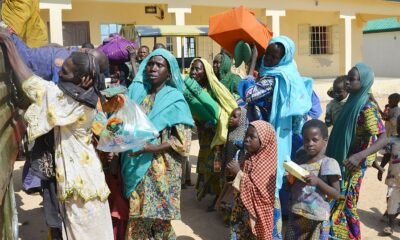
 Africa5 days ago
Africa5 days agoNigeria sentences 44 people to hard labour for financing Boko Haram militants
-

 Europe5 days ago
Europe5 days agoCole Palmer leads Chelsea to dominant victory over PSG to win FIFA Club World Cup
-
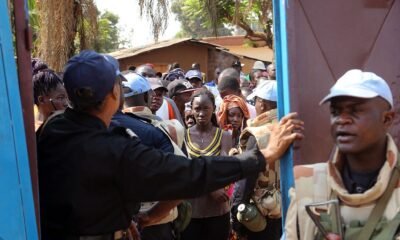
 Africa5 days ago
Africa5 days agoForty years and counting: CAR once again postpones local elections
-

 Lifestyle4 days ago
Lifestyle4 days agoLove Island sparks debate about race and dating among Black women
-
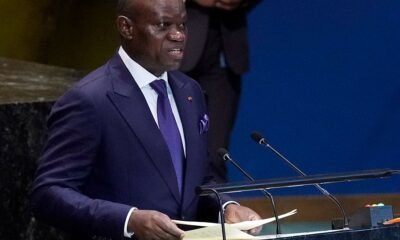
 Africa5 days ago
Africa5 days agoGabon launches electoral process for September 27 local and legislative elections
-
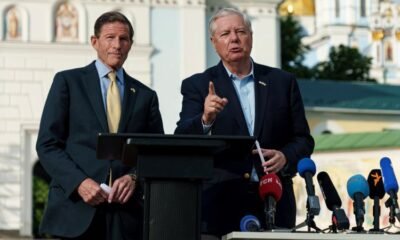
 Europe5 days ago
Europe5 days agoGOP senators tout Russia sanctions bill as ‘sledgehammer’ for Trump to end war
-

 Asia2 days ago
Asia2 days agoThai police arrest woman who allegedly seduced and blackmailed Buddhist monks




